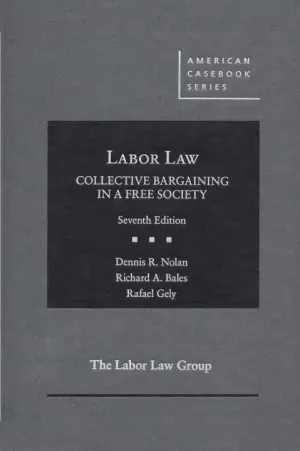Labor Law: Collective Bargaining in a Free Society, Eighth Edition
Publication Date: June 10, 2024
Labor Law: Collective Bargaining in a Free Society (Eighth Edition, West Academic, 2024)
Co-authored by Dennis R. Nolan, Richard A. Bales, Rafael Gely, and Brad Areheart for The Labor Law Group, this leading casebook provides a comprehensive exploration of American labor law and the collective bargaining system. Continuing a tradition that dates back to its first edition in 1972, the book balances historical context, statutory frameworks, case law, and policy debates to illuminate how collective bargaining operates within a democratic society. It is part of the American Casebook Series, designed for law school courses on labor law and industrial relations.
Part I traces the history of labor relations from early common law hostility toward worker combinations through major statutory enactments, including the Sherman and Clayton Acts, the Railway Labor Act, the Wagner Act, the Taft-Hartley Act, and the Landrum-Griffin Act. This historical foundation situates collective bargaining within broader struggles over the balance between labor and management, worker rights, and public policy. Part II examines core doctrinal issues: federal supremacy and preemption, the principle of exclusivity, bargaining units, organizing rights, union economic weapons, and the duty to bargain in good faith. Part III addresses enforcement of collective agreements, labor arbitration, no-strike clauses, successorship, and the interplay between Section 301 of the LMRA and the NLRB. The final chapters explore individual rights within unions, the duty of fair representation, and union security.
The Eighth Edition incorporates significant new developments, particularly NLRB decisions and enforcement strategies during the first Trump and the Biden administrations. It also introduces new co-author Brad Areheart and provides updated coverage of emerging issues, such as gig economy labor relations, contemporary disputes over bargaining units, and evolving doctrines on remedies and enforcement. Despite these updates, the casebook retains its distinctive pedagogical approach of presenting law through historical narrative, carefully curated cases, and thought-provoking notes and problems.
With its blend of history, doctrine, and pedagogy, Labor Law: Collective Bargaining in a Free Society remains one of the most respected and widely used labor law casebooks in the United States. It is designed to give students both a mastery of legal doctrine and a deeper understanding of labor law’s role in shaping workplace democracy and balancing competing interests of workers, employers, and the public.


